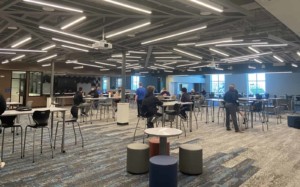Teaching and Learning at Acton – Without the Teaching

What if my kids woke me up every morning and made breakfast, just to be sure that they weren’t late for school? What if their curiosity were fostered at school as well as at home. What if in addition to learning to love learning and eagerly seeking their place in the world, my children were seeing two to three years academic growth every year?
As a parent, I am always seeking to balance an environment that both supports curiosity and agency and promotes authentic academic engagement. And I often write about what and ideal school environment might look like for my own kids. But this time the outcomes and environment aren’t theoretical – they are what a teacher named Kaylie Reed reports from a small school called Acton Academy in Austin Texas.
I had a delightful conversation with Kaylie, Acton Academy’s founding teacher, this week to learn how Acton works.
The academy begins with a focus on each child’s unique strengths and talents, even as kindergartners students talk about their talents, their passions, and the needs in the world and seek their calling in the intersection of the three. Throughout their time at the academy they study different examples of the Hero’s Quest and develop a way to think about how they can act in the world.
Days are structured with math, reading, and writing in the mornings and projects in the afternoons. The challenge with these kinds of structures is always how to follow through with the best intentions of being student-centered and student-driven when the temptation is to take back control and point students in the direction of passing standardized tests. According to Kaylie, as hard as it was, she had to learn to not only give up control, but to give up any traditional notion of “teaching” in order to turn that over to the students. Her role? Primarily helping students to set goals and help them see whether their behaviors are helping them to reach those goals.
Kaylie is a former Montessori teacher and loves to teach. That moment when after months of work a student finally “gets it” is one of the best rewards for her work. Eventually, though, instead of teaching the younger students to read, she stepped back and watched older students fill that role. Instead of selecting curriculum, she helped students explore various on-line resources and choose the ones they wanted to use to learn.
Acton Academy has evolved over time from a few homeschooling families to a one room schoolhouse (well, two rooms now) teaching 37 students in a primary and a middle school with plans for a high school in 2016. They are constantly looking at what is working with their students, keeping in mind their True North of being student-centered and student-driven, and modifying their work based on what they learn.
They use data in a rich, but human way. Acton collects weekly anonymous feedback from all students and parents regarding, simply, “How was this week?” They have also done standardized tests, but largely as an afterthought – there is no prep time whatsoever, just some explanation the night before of what standardized testing is. (Apparently students were terribly confused by the concept of adaptive tests the first year, “Why would I guess? If I get it right I’ll miss out on the opportunity to learn. And why shouldn’t I ask a peer if I have a question?”)
Admittedly, there is a tremendous amount of self-selection among the Acton population, but when breaking new ground it’s not necessarily a bad thing to do so with like-minded, passionate parents, students, and partners. Acton is now seeking entrepreneurial parents to essentially purchase a franchise at $10,000 in order to spread the Acton model to other neighborhoods. The idea is for a network of Acton schools to be incubators of learning in accordance with the Acton values and approaches that all share information transparently.
It’s an intriguing idea – the organic growth of a pedagogical approach and environment where the guiding principle includes learning to transfer much of what traditionally falls under a teacher role to the students themselves.







0 Comments
Leave a Comment
Your email address will not be published. All fields are required.